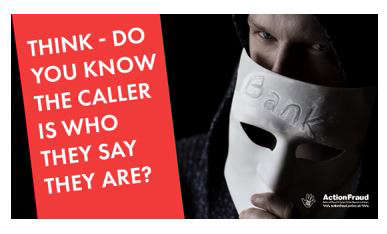
Officers at Northamptonshire Police are supporting a new national campaign aimed at raising awareness of courier fraud in a bid to prevent vulnerable people across the county from being exploited.
Typically, courier fraudsters claim to be a police officer or a member of staff from a victim’s bank and often pressure people into making quick financial decisions to assist with fictitious investigations.
Last year in the UK, 3,625 people were victims of courier crime, with loses totalling more than £15.2 million. Of those, 57 were some of the county’s most vulnerable residents who lost more than £108,000.
This has prompted officers from the Force’s Economic Crime Unit to get behind a new City of London Police campaign to share the tactics which are more commonly being used by courier fraudsters.
An analysis of National Fraud Intelligence Bureau (NFIB) data has highlighted the four preferred modus operandi (Mos) which are:
• Bank card expiry: Fraudsters claim to be from the victim’s bank and say their card is no longer valid. They ask for the pin number and then send a “courier” to collect the card before using it for fraudulent purposes.
• Purchasing high end items: The suspects pretend to be police officers and ask the victim to help with an undercover operation by purchasing expensive items like watches, jewellery, and gold. Once the item is bought, the victim will hand over the item to the criminal.
• Counterfeit cash/bank investigation: A person claiming to be a police or banking official informs the victim that they need to help with a banking corruption investigation. The victim is told to withdraw a large amount of money and the cash is picked up later by a courier to “check for fingerprints or to identify counterfeit bank notes”.
• Computer takeover: The fraudster telephones the victim, purporting to be from their internet service provider, saying that they have had an issue with their internet connectivity, and they are due compensation. The victim is persuaded to download a remote access application, giving the suspects access to their home computers. The fraudster persuades the victims into thinking that they have been paid too much compensation and the victims then withdraw cash to pay the money back, which is later collected by a courier.
Fraud Protect Officer PC Neil MacKenzie of the Force’s Economic Crime Unit said: “Fraudsters are callous individuals who prey on some of the most vulnerable and most trustworthy members of our community. Courier fraud is no exception.
“Our advice is that if you receive any call where you are asked to provide personal or financial information, is to take a few moments to reflect on the situation and stay calm. Never assume a phone call is genuine, even if the caller knows basic details about you, such as your name and address.
“You should also know that criminals can make any telephone number appear on your phone handset, so even if the number shown seems authentic, never trust this.
“Under no circumstances would the police or banks ask you to withdraw money from your account, or transfer funds into another account for fraud reasons, nor would they ever ask you to become part of an undercover investigation.
“If you receive a phone call of this type, have the confidence to end it. A genuine organisation will never mind you taking the time to think things over or to contact them back on a number you have verified, for example from your bank statement or payment card.
“If the caller is claiming to be a police officer, the relevant force can be contacted on 101 and will be able to verify if a caller is a genuine officer of member of staff.
“As fraudsters can keep telephone lines open for a while, the best advice is to use a separate line to make any subsequent phone calls. If you are using the same phone, wait at least five minutes after replacing the handset and call someone you know first to make sure the line is free.
“We would urge everyone who is involved in a caring or supportive role to people of these ages to start conversations about the tactics used and warning signs to look out for telephone fraud.
“Just having that conversation, especially if their loved one is not particularly tech savvy, could be the difference on whether someone becomes a victim of this trust-eroding crime.”
Signs of courier fraud are:
• Courier fraud usually starts with an unsolicited telephone call to the victim
• Typically, the suspect will pose as a bank official, police officer or a computer or utility engineer
• Courier fraudsters will usually request the victim purchases high value items such as Rolex watch and gold bullion, withdraws cash or provides a bank card for collection from a courier
• Fraudsters will instruct victims not to tell any family or friends about what they are doing
• When carrying out courier fraud, criminals will request the victim hangs up the phone to ring their bank for confirmation while keeping the line open. The suspect then purports to be bank official and provides false confirmation
• Fraudsters will also plan for a courier meet the victim to collect the item they have purchased.
Data from the NFIB shows that women between 70 to 89 years old lost more than £6.7 million to courier fraud in 2021. Men in the same age range lost almost £4.2 million during the same period.
Support services have been created to help combat nuisance calls, including the trueCall system. The device acts like a home receptionist and lets calls from friends and family straight through, but unrecognised callers are required to identify themselves before the call is put through and unwelcome callers are blocked.
Steve Smith, Director of trueCall, said: "Older and vulnerable people really do need protection - particularly those who live alone and those who have been scammed already.
“It is this demographic that are being specifically targeted by telephone scammers, receiving 20 per cent – 40 per cent more unwanted calls than the rest of the population."
If you think you have been a victim of fraud you should report it to Action Fraud, the UK’s national fraud reporting centre by calling 0300 123 20 40 or online by visiting www.actionfraud.police.uk.
It’s also important to report all fraud-related incidents to Action Fraud to help build a national picture and help prevent others falling victim to scams.


 New websites brings together activities and offers of support in your neighbourhood
New websites brings together activities and offers of support in your neighbourhood
 Outline of progress on Sandy Lane Relief Road
Outline of progress on Sandy Lane Relief Road
 Summer road maintenance scheme to begin
Summer road maintenance scheme to begin
 Less than 500 days to go to Women’s Rugby World Cup 2025
Less than 500 days to go to Women’s Rugby World Cup 2025
 Help shape the future planning in West Northamptonshire
Help shape the future planning in West Northamptonshire
 Help shape West Northamptonshire’s approach to manage flood risk across the area
Help shape West Northamptonshire’s approach to manage flood risk across the area
 Northamptonshire Police, Fire and Crime Commissioner election to be held next month
Northamptonshire Police, Fire and Crime Commissioner election to be held next month
 18 West Northamptonshire entrepreneurs awarded business grants
18 West Northamptonshire entrepreneurs awarded business grants



Comments
Add a comment